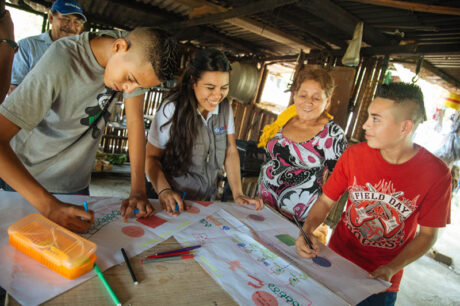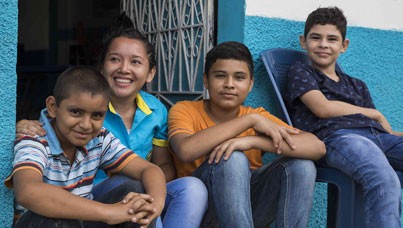Un élève du secondaire assiste à un programme après l'école pendant plusieurs semaines, faire des sports d'équipe, faire des arts et de l'artisanat et recevoir un tutorat et une aide aux devoirs. Nous savons que ces types de programmes peuvent avoir un impact positif sur les participants - mais comment les résultats peuvent être mesurés?
Le Communauté, Résilience des familles et des jeunes programme, qui est financé par leNOUS. Agence pour le développement international et mis en œuvre par Creative Associates International, s'est tourné vers l'idée de l'auto-efficacité pour répondre à cette question.
Tamara Hart, L'agent de terrain de suivi et d'évaluation du programme basé à ST. Kitts, a exploré l'idée d'auto-efficacité au Sommet mondial des opportunités économiques pour les jeunes dans un séance d'évasion intitulé «Outils pour l'apprentissage axé sur les jeunes: Développement et mesure essentiels des compétences pour un monde en mutation de travail. »
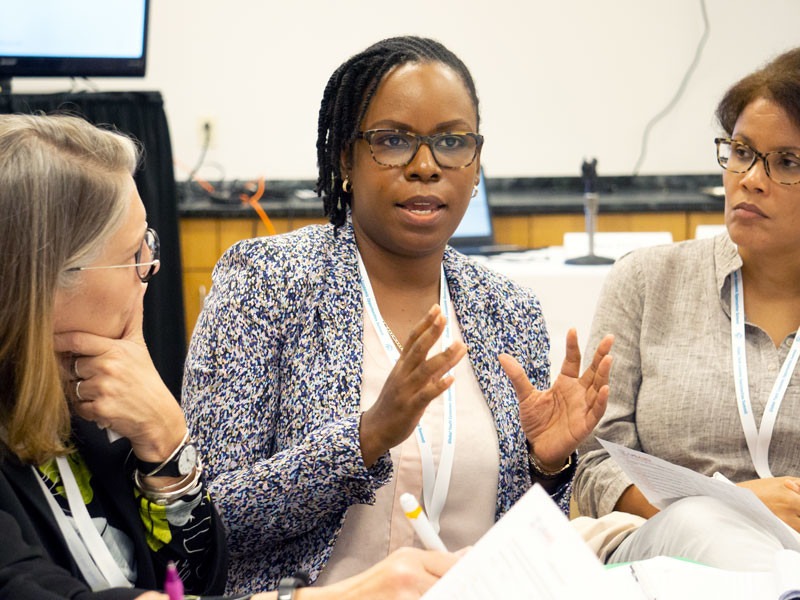
«L'auto-efficacité se concentre vraiment sur un individu’S Perception de leur capacité à effectuer une tâche donnée. Il’s différent de l'estime de soi en ce qu'il n'est pas nécessairement lié à la façon dont quelqu'un se sent en tant que personne en tant que personne," dit-elle.
Avec une grande portée géographique, un large groupe de bénéficiaires âgés allant de 10 à 29 et divers objectifs - y compris la prévention de la criminalité et de la violence, Construire la résilience et développer des compétences de main-d'œuvre - le programme voulait trouver un outil qui pourrait capturer ses résultats de grande envergure, Hart a dit.
«Nous avons déterminé que l'auto-efficacité était un bon choix pour notre programme afin d'avoir cette mesure qui peut suivre le changement à tous nos participants dans tous ces programmes dans trois pays,"Hart a dit.
Le programme utilise une série de 24 questions, Demandé avant et après une intervention, pour mesurer l'auto-efficacité, qui est un élément clé de l'agence de promotion et développement positif de la jeunesse. Le questionnaire explore plusieurs domaines distincts d'auto-efficacité, Hart a expliqué: général, rue (Votre capacité à vous garder en sécurité), sociale, émotionnel et académique, qui s'alignent sur les priorités du programme.
«L'auto-efficacité a un impact, Vos pensées, Votre motivation et vos sentiments," dit-elle. «Cela nous a vraiment appliqué parce que nous envisageons la modification du comportement, Réduire les facteurs de risque et renforcer la résilience… et il y a une corrélation positive entre l'auto-efficacité et la résilience, ou la capacité de s'adapter positivement malgré l'adversité. »
Avec le questionnaire, Le projet a pu quantifier les effets positifs sur l'auto-efficacité parmi des centaines de jeunes qui ont participé à USAID Programmes de relâche après l'école et de printemps.
Hart a dit que du 327 Les jeunes qui ont été mesurés - à peu près uniformément entre garçons et filles - 75 pour cent a vu une augmentation de leur auto-efficacité.
Propriété des jeunes de l'apprentissage
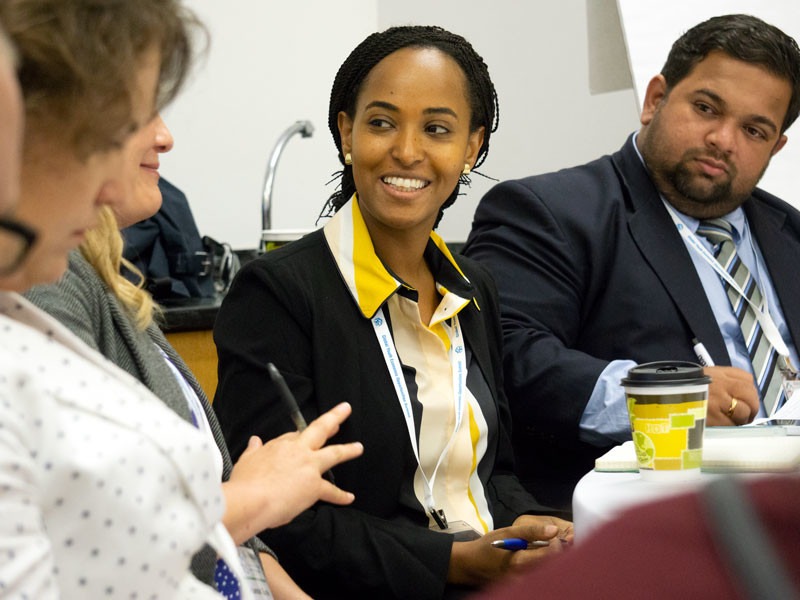
Tsaga Belachew était présenté aux côtés de Hart, Place technique pour les opportunités économiques des jeunes à IREX, et Churchill Saoke de Permanents de l'opportunité de Kean Au Kenya, qui s'est associé à IREX sur une initiative de formation des jeunes. La séance d'évasion a été facilitée par Sara Danish, Associé de gestion à Creative Domaine de pratique de la sécurité des citoyens.
Belachew et Saoke ont présenté deux initiatives IREX, Un système de badges numérique et le modèle de formation des compétences essentielles pour les jeunes.
Belachew a expliqué qu'IREX s'était associé à des universités publiques en Ouganda, La Tunisie et le Kenya pour adapter les outils pour la formation des compétences générales et passer d'un instructeur, Modèle de théorie dans lequel les jeunes sont des apprenants passifs à une approche dans laquelle les jeunes prennent les devants dans leur propre éducation.
«Les jeunes doivent être adaptables, apprenants à vie. Les jeunes doivent être en mesure d'acquérir des compétences et de se relancer pour naviguer dans l'incertitude. En substance, Ils doivent être des apprenants experts,"Belachew a dit. «L'avenir a besoin d'un processus d'apprentissage qui permet aux jeunes de conduire leur propre apprentissage, qui leur permet de devenir autosuffisant, pour accéder aux ressources. »
Le modèle de formation a donné à la propriété des jeunes sur chaque étape de leur apprentissage, du développement du programme, Offrir les formations, Mettre ce qu'ils ont appris dans la pratique et évaluer les résultats.
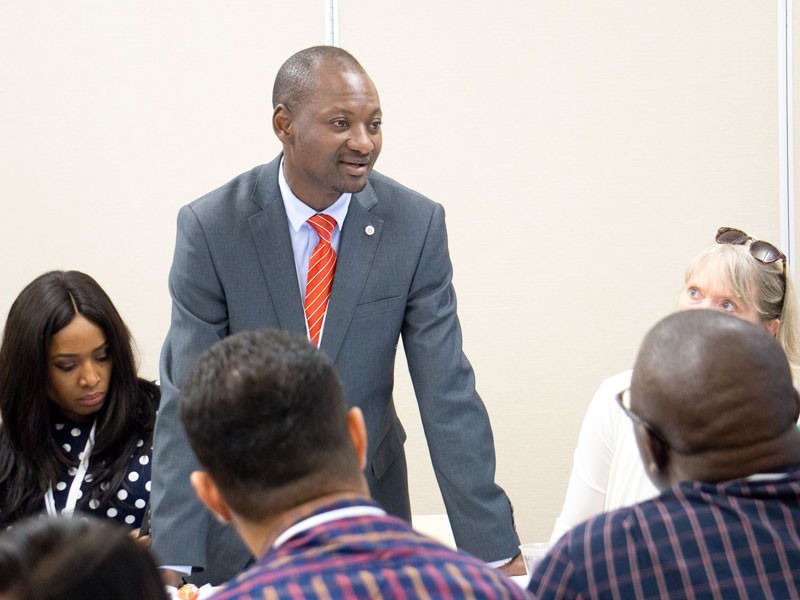
Une partie du programme comprenait un «badge numérique» qui marque les réalisations des participants et leur permet de présenter leurs compétences aux employeurs potentiels.
Au Kenya, Le pilote des compétences essentielles des jeunes d'IREX s'est concentrée sur quatre 10 compétences clés: Pensée de l'entrepreneuriat, Pensée à haut niveau, communication et collaboration. Une plateforme en ligne a aidé les jeunes à s'approprier leur apprentissage, suivre leurs progrès et réfléchir aux compétences qu'ils accumulent.
«Cela aide les apprenants à découvrir leurs compétences… et cela les aide à posséder leur apprentissage et à contrôler ce qu'ils apprennent,"Saoke a dit. «Plus important encore, Cela les rend responsables de leur apprentissage et leur permet d'apprendre et de développer continuellement leurs compétences. »
Avec ces outils pour placer les jeunes dans le siège du conducteur de la construction de leurs propres compétences et de l'auto-efficacité et de la mesure des résultats, Les programmes de développement des jeunes - que ce soit en Guyane ou au Kenya - peut mieux préparer les jeunes à réussir dans le monde en mutation du travail.

